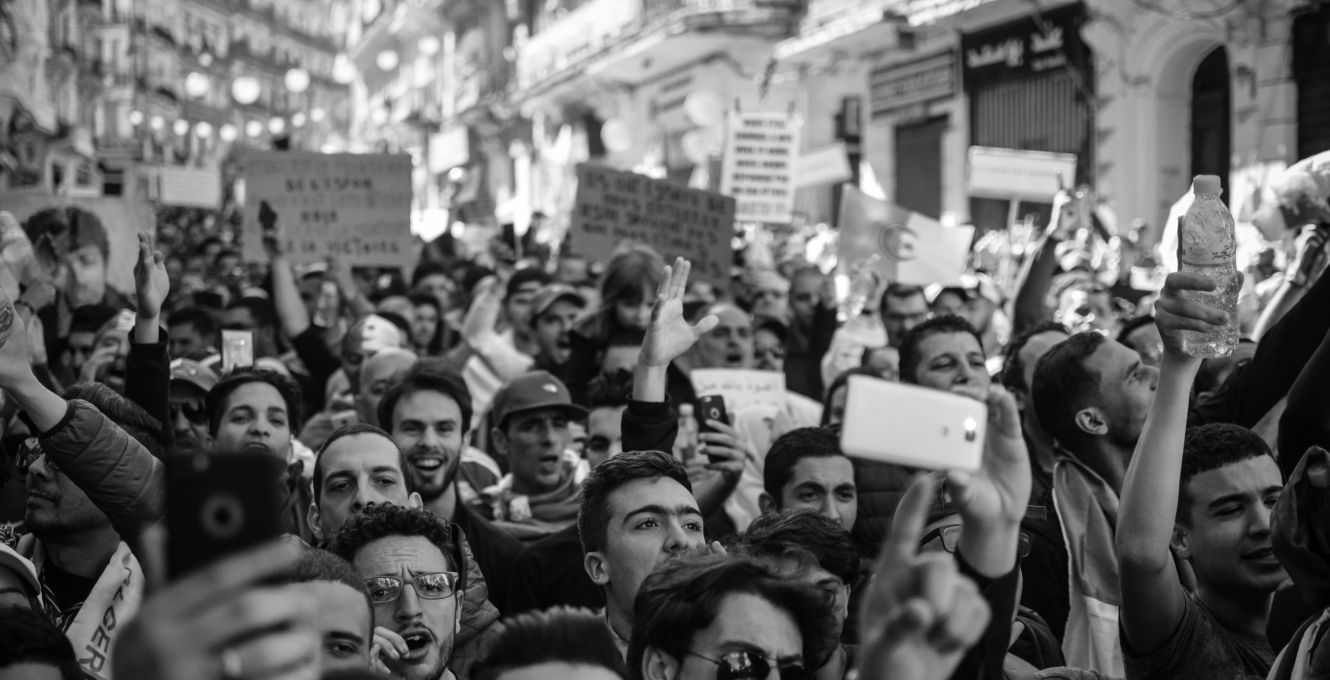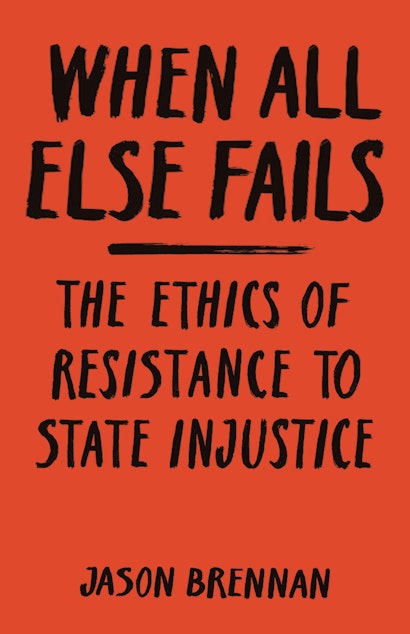The economist Albert O. Hirschman famously argued that citizens of democracies have only three possible responses to injustice or wrongdoing by their governments: we may leave, complain, or comply. But in When All Else Fails, Jason Brennan argues that there is a fourth option. When governments violate our rights, we may resist. We may even have a moral duty to do so. The result is a provocative challenge to long-held beliefs about how citizens may respond when government officials behave unjustly or abuse their power.
What led you to write this book?
JB: Almost daily for the past year, I have come across news stories about police officers using excessive violence against civilians, or about people being arrested and having their lives ruined over things that shouldn’t be crimes in the first place. I watched the Black Lives Matter protests and started reading histories of armed resistance. I watched as president after president killed innocent civilians while pursuing the “War on Terror.” I see people’s lives destroyed by the “War on Drugs,” which continues on the same course even though we have strong evidence it makes things worse, not better. Every day, government agents acting ex officio are committing severe injustices.
I ascertained that contemporary philosophy was largely impotent to analyze or deal with these problems. Most political philosophy is about trying to construct a theory of an ideal, perfectly just society, which means philosophers usually imagine away the hard problems rather than consider how to deal with those problems. Philosophers often try to justify the government’s right to commit injustice, but they often rely upon irrelevant or incoherent models of what governments and their agents are like. For example, Suzanne Dovi’s theory of political representation is grounded in a false theory of voter behavior, while John Rawls’s argument for government simultaneously assumes people are too selfish to pay for public goods, and government agents are too angelic to abuse their power. I saw an opening not only to do original philosophy, but to do work that bears on the pressing events of our times.
You can see that in the book. The “thought experiments” I use are all based on actual cases, including police officers beating up black men who did nothing more than roll slightly past a stop sign; officers shooting unarmed, subdued men; governments spying on and wiretapping ordinary citizens; drone strikes on innocent civilians; throwing people in jail for smoking marijuana or snorting cocaine; judges having to enforce absurd sentences or unjust laws; and so on.
Can you give a summary of your argument?
JB: The thesis is very simple: the conditions under which you may exercise the right of self-defense or the right to defend others against civilians and government agents are the same. If it is permissible to defend yourself or others against a civilian committing an act, then it is permissible to defend yourself or others against a government agent committing that same act. For instance, if I wanted to lock you in my basement for a year for smoking pot, you’d feel no compunction in defending yourself against me. My thesis is that you should treat government agents the same way.
My main argument is also simple: Both laypeople and philosophers have offered a few dozen arguments trying to defend the opposite conclusion: the view that government agents have a kind of special immunity against defensive resistance. But upon closer examination, we’ll see each of the arguments are bad. So, we should conclude instead that our rights of self-defense or to defend others against injustice do not simply disappear by government fiat. On closer inspection, there turns out to be no significant moral difference between the Commonwealth of Virginia imprisoning you for owning pot and me imprisoning you in my basement for the same thing.
To be clear, I am not arguing that you may resist government whenever you disagree with a law. Just as I reject voluntarism on the part of government—I don’t think governments can simply decide right and wrong—so I reject voluntarism on the part of individuals. Rather, I’m arguing that you may resist when governments in fact violate people’s rights or in fact cause unjust harm.
Some will no doubt complain this thesis is dangerous. In some ways it is, and I take care to highlight how to be careful about it in the book. But on the other hand, the opposite thesis—that we must defer to government injustice—is no doubt even more dangerous. People tend to be deferential and conformist. Most people will stand by and do nothing while armed officers send people to death camps. Stanley Milgram showed most people will electrocute another person to death because a man in a white lab coat told them to. If anything, defenders of the other side—of the view that we should defer to government injustice—have a duty to be cautious pushing their dangerous view.
Can you talk a bit about the meaning behind the title? What exactly has to fail in order to justify the actions you describe?
JB: Usually, lying, stealing, destroying property, hurting others, or killing others is wrong. However, you may sometimes perform such actions in self-defense or in defense of others. The basic principle of defense, codified in both common law and commonsense morality, is this: you may use a defensive action (such as sabotage, subterfuge, deceit, or violence) against someone else when they are initiating a severe enough injustice or harm, but only if it is necessary to defend yourself. Here, “necessary” means that you cannot use violence if a nonviolent means of defense is equally effective; you cannot use deceit if a non-deceitful means of defense is equally effective. So, the title is meant to signal that defensive actions—such as deceit or violence—are, if not quite last resorts, not first resorts either.
What is the place of uncivil disobedience within a peaceful and successful polity?
JB: What we call “civil disobedience” is a form of public protest. In civil disobedience, people publicly and explicitly break the law for the purpose of trying to have the law changed. They will often accept legal punishment, not necessarily because they think punishment is warranted and that even bad laws must be respected, but because it is strategic to do so to garner sympathy for their cause. Civil disobedience is about social change.
But self-defense is not about social change. If I kill a would-be mugger, I’m not trying to reduce crime or change gun policy. I’m trying to stop myself from being the victim of that particular injustice. Similarly, if you had been present and had acted in defense of Eric Garner, you would not necessarily have been trying to fix American policing—you would have just been trying to save Garner’s life. Defensive actions—or uncivil disobedience—are about stopping particular wrongdoers from committing particular harms or violating particular people’s rights.
What are your thoughts on recent protests and movements such as Take a Knee, Me Too, and March for our Lives?
JB: Globally, US policing and US criminal policy are outliers. American criminal justice is unusually punitive and harsh. We have 4.4% of the world’s population but around 25% of the world’s prisoners. We give longer, harsher sentences than illiberal countries such as Russia or China. Our police are unusually violent, even to the most privileged in our society. I applaud movements that bring attention to these facts.
It wasn’t always this way. In the 1960s, though the US had a higher than normal crime rate, its sentence lengths, imprisonment rate, and so on, were on the high end but similar to those of other liberal, rich, democratic countries. But starting in the 1970s, things got worse.
Right now, Chris Surprenant and I are writing a book called Injustice for All explaining why this happened and offering some ideas about how to fix it. We argue that the problem is not explained by racism (as leftists argue), the War on Drugs (as libertarians argue), or crime and family collapse (as conservatives argue), though these things are each important factors. Rather, the US criminal justice system became dysfunctional because nearly every person involved—from voters to cops to judges to politicians—faces bad incentives created by bad rules.
Are there examples from history of individuals or groups following your philosophy with success?
JB: Two recent books, Charles Cobb Jr.’s This Non-Violent Stuff’ll Get You Killed and Akinyele Omowale Umoja’s We Will Shoot Back provide strong evidence that the later “nonviolent” phase of civil rights activism succeeded (as much as it has) only because in earlier phases, black Americans involved in protest armed themselves in self-defense. Once murderous mobs and law enforcement learned that they would fight back, they turned to less violent forms of oppression, and activists in turn began using the nonviolent tactics with which we are familiar.
Do you think there are changes that can be made that would lessen instances in which uncivil disobedience is justified?
JB: A facile answer: all governments have to do is respect citizens’ rights.
More realistically: we need to train police differently, change recruitment tactics, and stop using SWAT teams so often. We should decriminalize many behaviors that are currently criminalized. We need to change tax codes so that poor localities are not dependent upon law enforcement issuing tickets to gain revenue. We need Congress to rein in the executive branch’s war and surveillance powers.
But even these kinds of ideas are too facile, because there is no willpower to make such improvements. Consider an example: violent crime in the US has been dropping since 1994 (and no, it’s not because we keep locking up all the violent criminals). Yet most Americans mistakenly believe, year after year, that crime is rising. They feel scared and vote for politicians who promise to be tough on crime. The politicians in turn support more confrontational, occupying-force style methods of policing. Here, we know what the problem is, but to fix the system we need to fix the voters, and we don’t know how to do that. To be clear, When All Else Fails is not a theory of social change, and not a prescription for fixing persistent or systematic social problems. As I often tell my political economy students, while we may know which institutions work better than others, no one yet has a good account of how to move from bad institutions to good.
Jason Brennan is the Robert J. and Elizabeth Flanagan Family Professor of Strategy, Economics, Ethics, and Public Policy at Georgetown University’s McDonough School of Business. His many books include Against Democracy and The Ethics of Voting.

